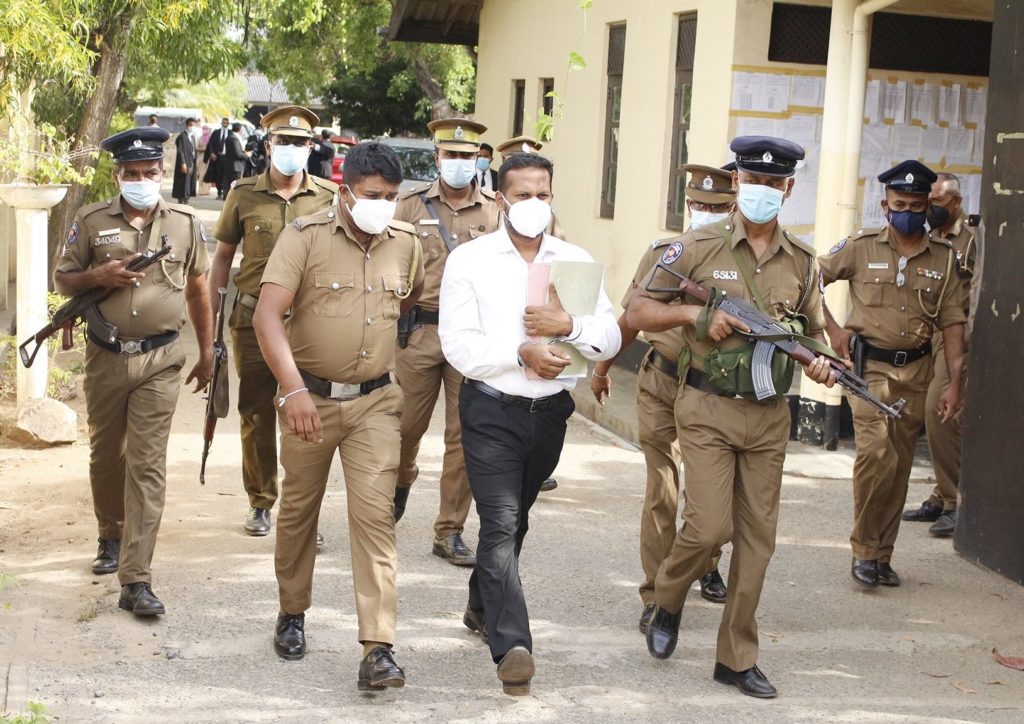Photo courtesy of TRUTHOUT
Two prisoners in Sri Lanka were recently released after being detained for many years, a harsh reminder of the ease with which people can be locked up on flimsy grounds. This has fuelled criticism of the Prevention of Terrorism Act (PTA), in particular, and in general a supposed justice system that can be blatantly unjust. Although minorities have been most affected, anyone outside the ruling family and its inner circle could find themselves a victim, especially at a time of rising discontent.
In one case, a young poet who lamented the state of the world (as those who write poetry often do) has been bailed after one-and-a-half years, although still at risk of imprisonment in future. Another man, no longer young, spent an appalling 15 years awaiting trial before he was acquitted. Yet the scope of PTA was widened even further in 2021 and there is a risk that repressive measures and practices overall will grow worse, rather than better, unless major changes are made. This is not even a case of sacrificing individual rights in the interests of public safety; such laws protect only a handful in power while leaving ordinary people increasingly unsafe.
Locked up without cause
Ahnaf Jazeem, a 27-year-old poet and teacher, was granted bail in mid-December by Puttalam High Court. He was arrested in May 2020 under the PTA over allegations that he had promoted extremism and violence in children and aided and abetted Muslim extremism through his writing.
The author of a collection of poetry in Tamil, Navarasam, he was seized against the backdrop of heightened victimisation of Muslims by the state and ongoing targeting of Tamils. He was held in squalid conditions, waiting for months to get access to legal representation and see his family. As literary experts pointed out, far from glorifying terrorism, he expressed dismay at terrorist violence and war, praising instead a more humane and spiritual way of life and evidence suggests that he had warned his students against extremism.
His disgraceful treatment became known not only within Sri Lanka but also internationally and human rights campaigners called for him to be set free. The Attorney General did not oppose bail but Ahnaf Jazeem still faces charges so he cannot get on with trying to rebuild his life.
Thevarasa Sivapalan had to wait 15 years before being acquitted by Colombo High Court, also in mid-December. He had been arrested on suspicion of smuggling weapons. His daughter was about one year old when her father disappeared from her life for a many years. Another Tamil, Kapilan Kathiravelu, was acquitted in October by Monaragala Magistrate’s Court after 12 years in prison over alleged links to the LTTE after his lawyer pointed out that there was insufficient evidence.
Calls for change
Critics of human rights abuses in Sri Lanka have often pointed to the injustices in the system that is supposed to protect citizens and deliver justice, in particular the PTA. Instead, the government issued even more drastic regulations under the PTA in early 2021, adding to the already vague grounds on which people can be seized and held at the state’s whim without adequate opportunity to demonstrate their innocence.
Since then, there has been a softening of the hardline stance taken by Sri Lanka’s rulers and promises of reform, yet the signs are far from promising. In early December, a civil society statement on the government’s proposals to reform the PTA called for genuine, significant change. This was echoed by UN experts while the Sri Lankan government response was predictably disappointing.
The PTA does not increase public protection against terrorist acts while sacrificing some innocent individuals and families in the process – quite the opposite. It can be used to frame minorities as an enemy and hence promote terror against them, alienating sizeable sections of the population so that they are less likely to cooperate with the police to crack down on violent criminality. The PTA also makes it harder to protest against state measures such as failures in public health that endanger the public and makes indifference to cruelty seem normal.
It is time to change the balance of power so that ordinary Sri Lankans are treated with dignity and respect by the leaders who are meant to serve them.
